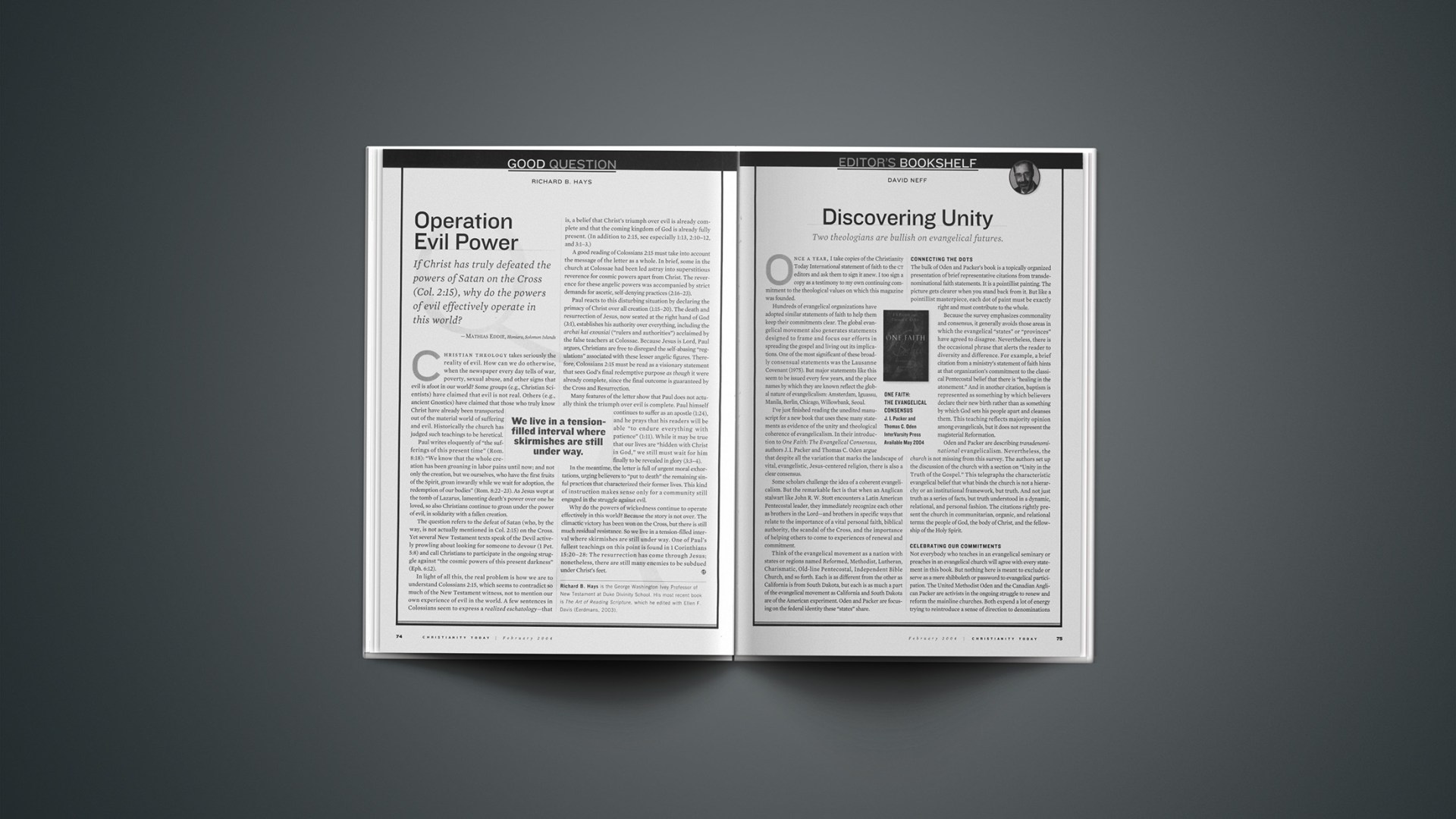Christian theology takes seriously the reality of evil. How can we do otherwise, when the newspaper every day tells of war, poverty, sexual abuse, and other signs that evil is afoot in our world? Some groups (e.g., Christian Scientists) have claimed that evil is not real. Others (e.g., ancient Gnostics) have claimed that those who truly know Christ have already been transported out of the material world of suffering and evil. Historically the church has judged such teachings to be heretical.
Paul writes eloquently of “the sufferings of this present time” (Rom. 8:18): “We know that the whole creation has been groaning in labor pains until now; and not only the creation, but we ourselves, who have the first fruits of the Spirit, groan inwardly while we wait for adoption, the redemption of our bodies” (Rom. 8:22-23). As Jesus wept at the tomb of Lazarus, lamenting death’s power over one he loved, so also Christians continue to groan under the power of evil, in solidarity with a fallen creation.
The question refers to the defeat of Satan (who, by the way, is not actually mentioned in Col. 2:15) on the Cross. Yet several New Testament texts speak of the Devil actively prowling about looking for someone to devour (1 Pet. 5:8) and call Christians to participate in the ongoing struggle against “the cosmic powers of this present darkness” (Eph. 6:12).
In light of all this, the real problem is how we are to understand Colossians 2:15, which seems to contradict so much of the New Testament witness, not to mention our own experience of evil in the world. A few sentences in Colossians seem to express a realized eschatology—that is, a belief that Christ’s triumph over evil is already complete and that the coming kingdom of God is already fully present. (In addition to 2:15, see especially 1:13, 2:10-12, and 3:1-3.)
A good reading of Colossians 2:15 must take into account the message of the letter as a whole. In brief, some in the church at Colossae had been led astray into superstitious reverence for cosmic powers apart from Christ. The reverence for these angelic powers was accompanied by strict demands for ascetic, self-denying practices (2:16-23).
Paul reacts to this disturbing situation by declaring the primacy of Christ over all creation (1:15-20). The death and resurrection of Jesus, now seated at the right hand of God (3:1), establishes his authority over everything, including the archai kai exousiai (“rulers and authorities”) acclaimed by the false teachers at Colossae. Because Jesus is Lord, Paul argues, Christians are free to disregard the self-abasing “regulations” associated with these lesser angelic figures. Therefore, Colossians 2:15 must be read as a visionary statement that sees God’s final redemptive purpose as though it were already complete, since the final outcome is guaranteed by the Cross and Resurrection.
Many features of the letter show that Paul does not actually think the triumph over evil is complete. Paul himself continues to suffer as an apostle (1:24), and he prays that his readers will be able “to endure everything with patience” (1:11). While it may be true that our lives are “hidden with Christ in God,” we still must wait for him finally to be revealed in glory (3:3-4).
In the meantime, the letter is full of urgent moral exhortations, urging believers to “put to death” the remaining sinful practices that characterized their former lives. This kind of instruction makes sense only for a community still engaged in the struggle against evil.
Why do the powers of wickedness continue to operate effectively in this world? Because the story is not over. The climactic victory has been won on the Cross, but there is still much residual resistance. So we live in a tension-filled interval where skirmishes are still under way. One of Paul’s fullest teachings on this point is found in 1 Corinthians 15:20-28: The resurrection has come through Jesus; nonetheless, there are still many enemies to be subdued under Christ’s feet.
Richard B. Hays is the George Washington Ivey Professor of New Testament at Duke Divinity School. His most recent book is The Art of Reading Scripture, which he edited with Ellen F. Davis (Eerdmans, 2003).
Copyright © 2004 Christianity Today. Click for reprint information.
Related Elsewhere:
Earlier Good Question columns include:
What does Genesis mean by man being made in the image of God?
How is it that not all prayers for the salvation of others are answered?
If God is in us, shouldn’t it be easier to love one another?
Is there a biblical principle behind the punishment of those who break the law?
Won’t heaven’s joy be spoiled by our awareness of unsaved loved ones in hell?
Where exactly do “Oneness” Pentecostals stand in relation to orthodoxy?
Do a man and a woman become married after having sex or after exchanging vows?
Can We Expect God to Forgive Unbelievers Who ‘Don’t Know What They’re Doing’?










